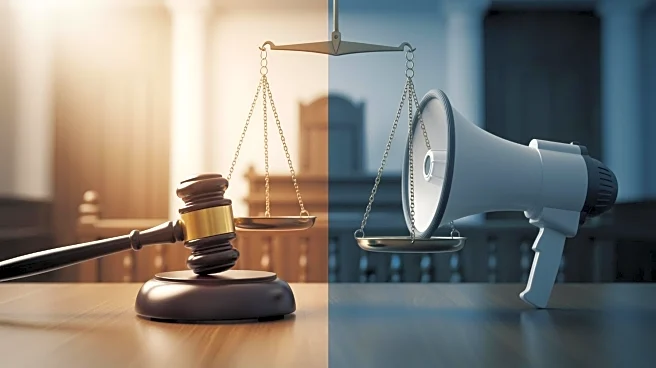What's Happening?
The Netflix documentary series 'The Echoes of Survivors: Inside Korea’s Tragedies' has sparked significant controversy and legal challenges in South Korea. The series, which delves into four major Korean
tragedies, including the Jesus Morning Star cult and the Busan Brothers’ Home, has faced backlash for its portrayal of sensitive topics. Just before its scheduled premiere, the Jesus Morning Star cult filed for an injunction to prevent the series from airing, citing concerns over its content. Despite these legal hurdles, the series premiered as planned. The documentary aims to shed light on the survivors' stories, but its approach has been criticized for being insensitive, particularly in its depiction of the Busan Brothers’ Home incident.
Why It's Important?
The controversy surrounding 'The Echoes of Survivors' highlights the ongoing struggle between freedom of expression and sensitivity towards traumatic events. The series' portrayal of historical tragedies has raised questions about the ethical responsibilities of filmmakers in handling sensitive subjects. The backlash underscores the potential impact of media on public perception and the importance of respectful representation of survivors' experiences. This situation also reflects broader societal issues regarding how past traumas are addressed and remembered, which can influence public discourse and policy on historical accountability and victim support.
What's Next?
The outcome of the legal proceedings initiated by the Jesus Morning Star cult remains pending, which could set a precedent for future media productions dealing with sensitive historical content. The series' reception may prompt Netflix and other content creators to reassess their approach to similar projects, balancing storytelling with ethical considerations. Additionally, the public and critical response may influence future documentaries and media portrayals of historical events, potentially leading to more stringent guidelines or self-regulation within the industry.
Beyond the Headlines
The series' release has sparked a broader conversation about the role of media in shaping historical narratives and the ethical implications of revisiting traumatic events. It raises questions about the responsibilities of content creators in ensuring that their work does not retraumatize survivors or exploit their stories for entertainment. This situation also highlights the cultural and legal challenges faced by international media companies operating in diverse markets, where local sensitivities and historical contexts must be carefully navigated.









